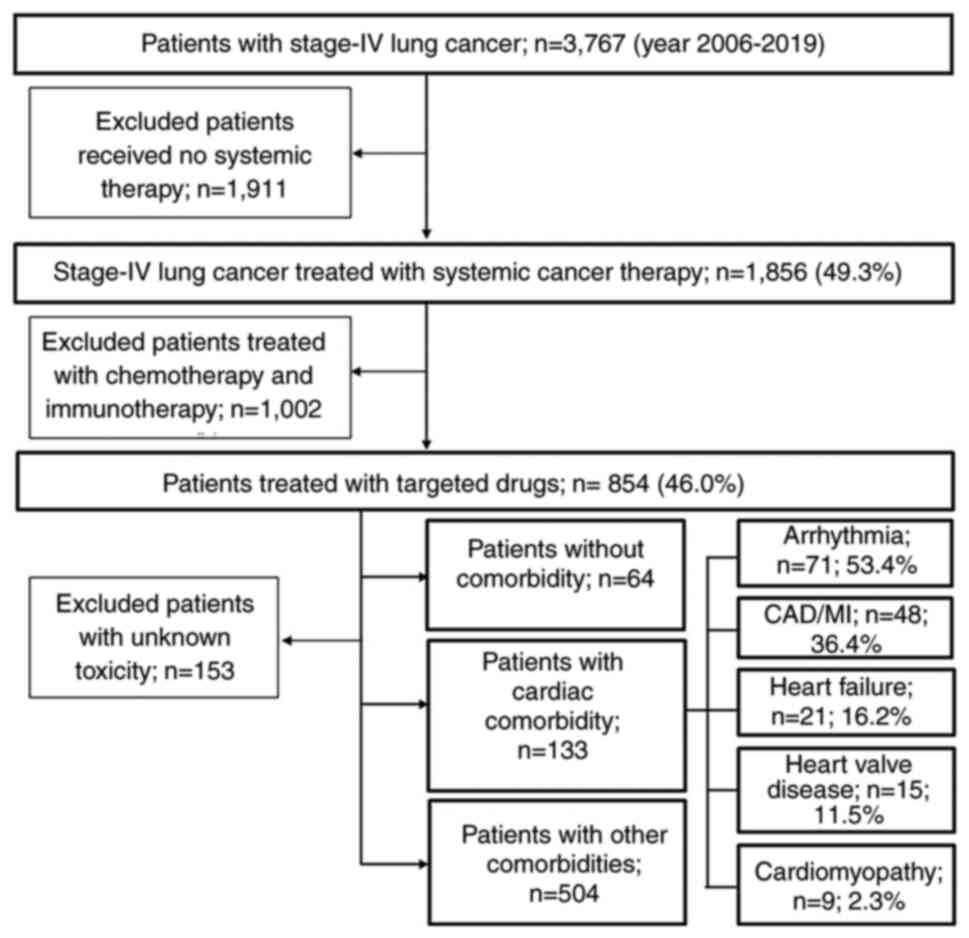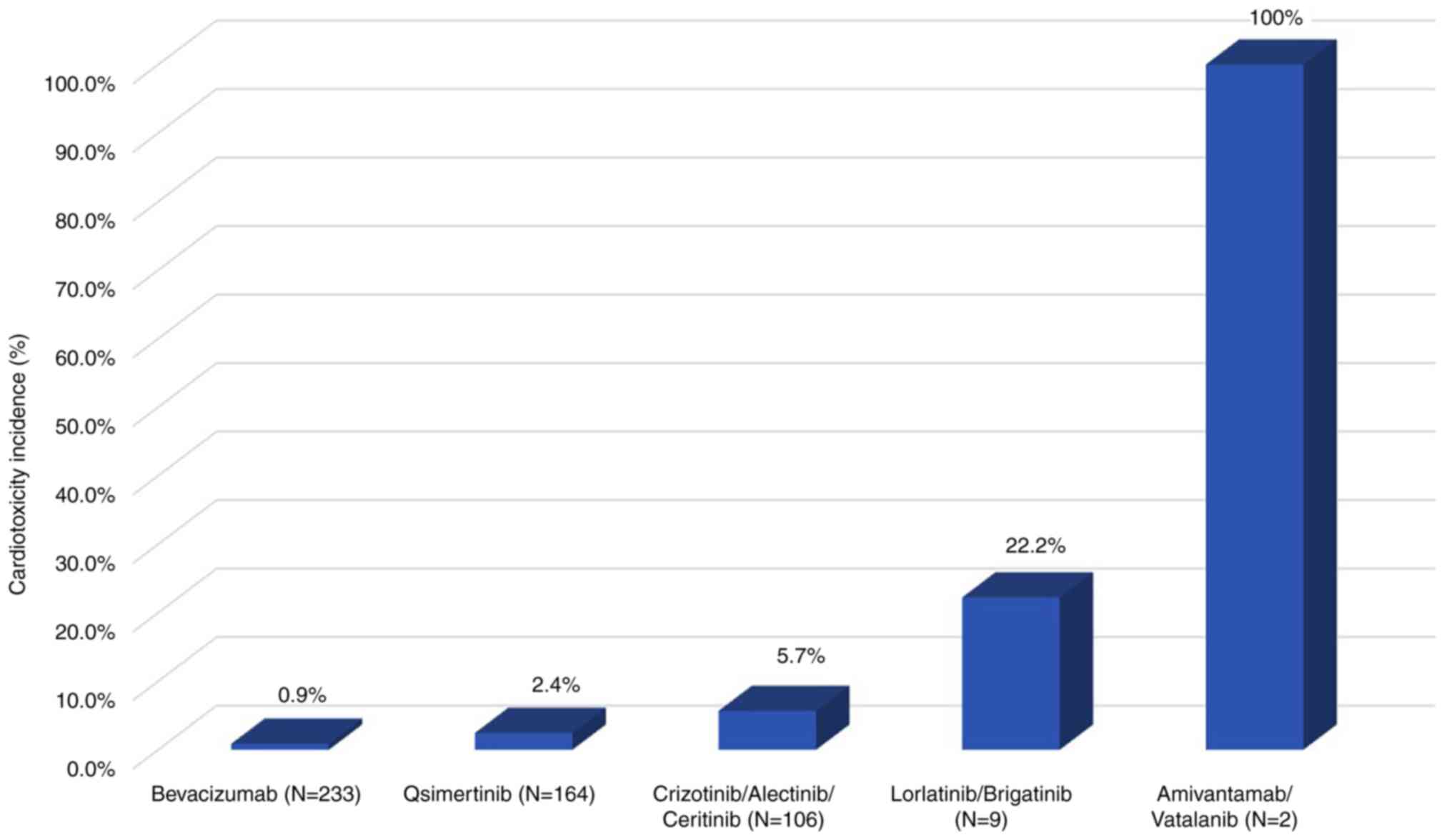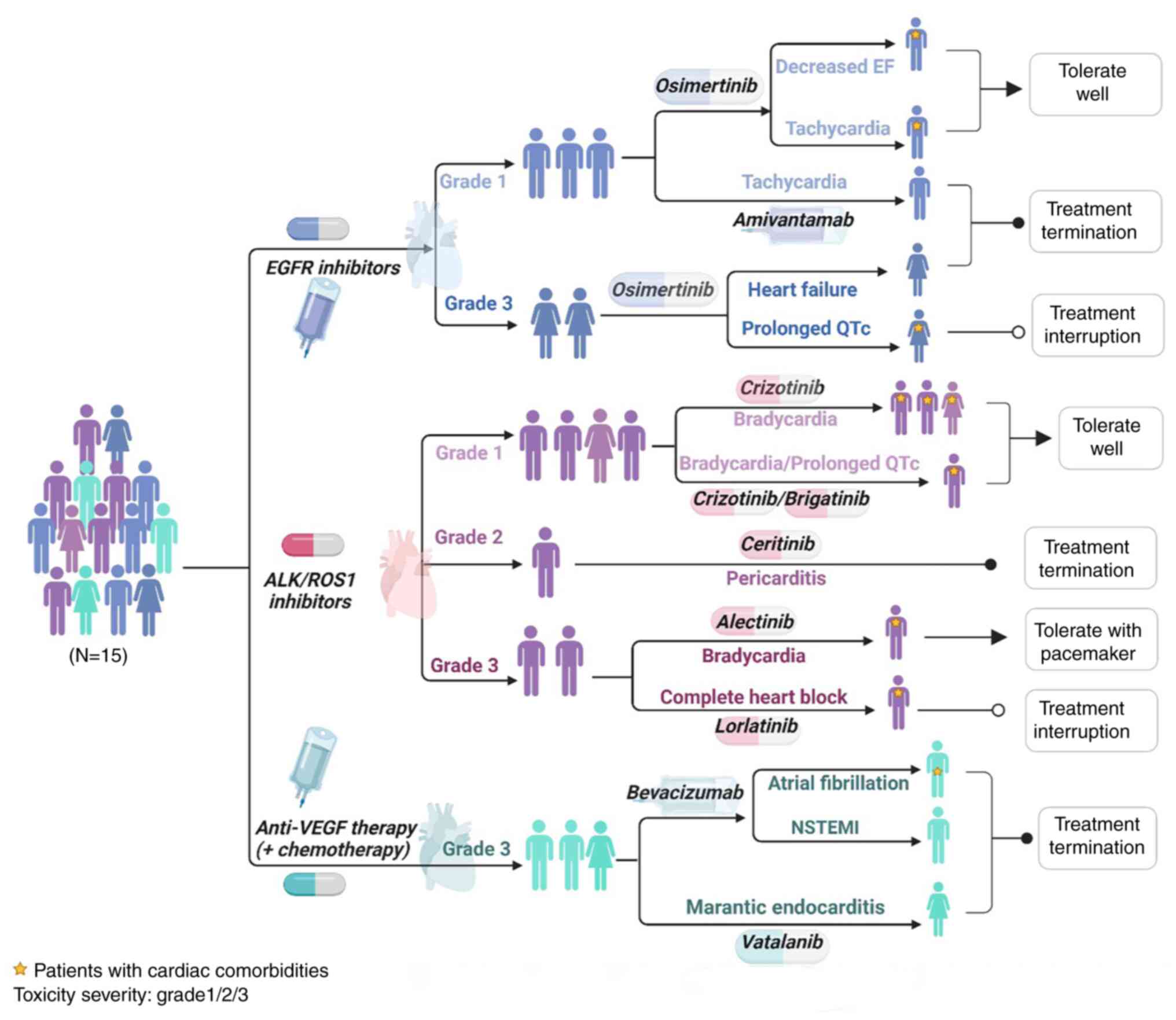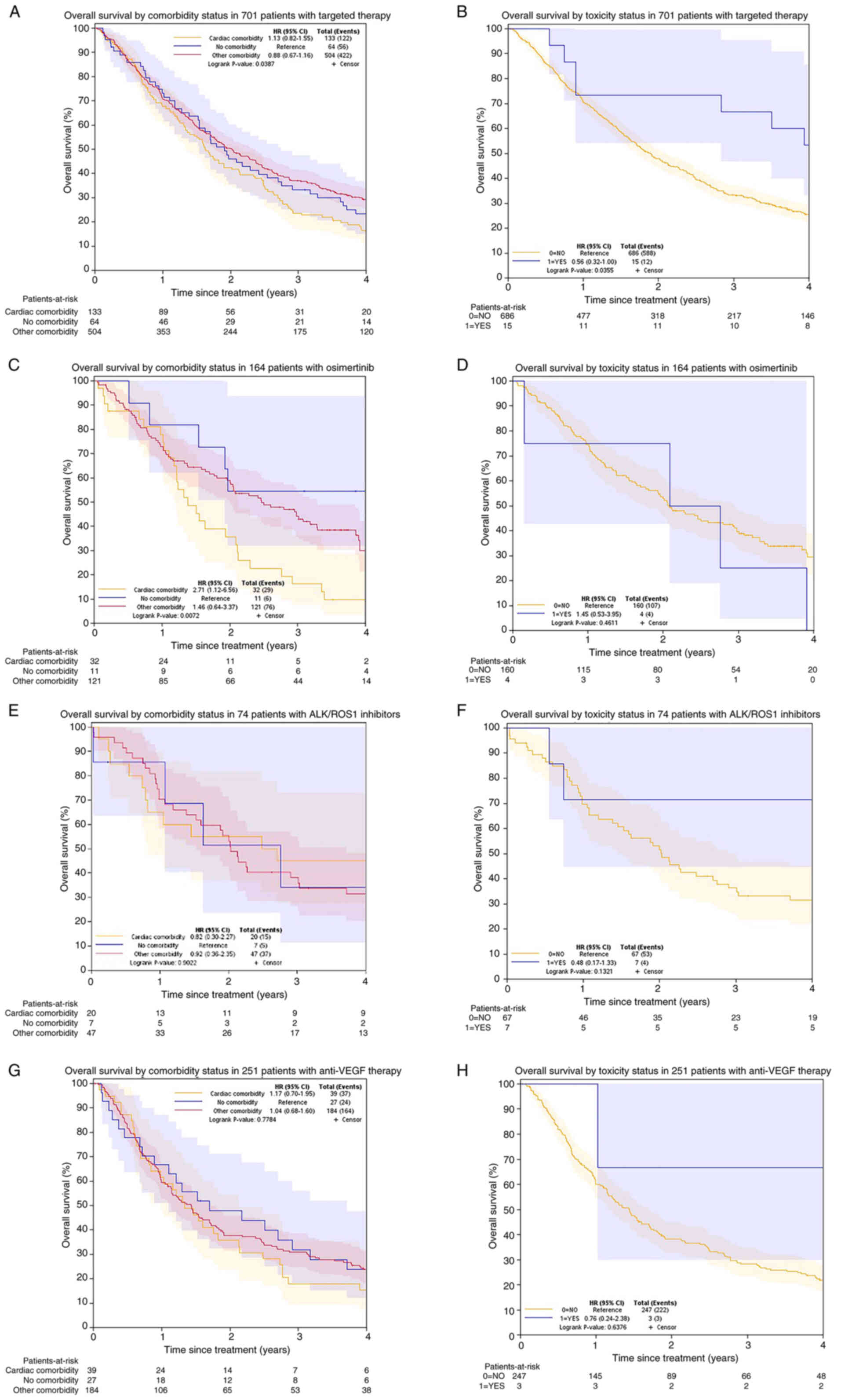|
1
|
Lu S, Kato T, Dong X, Ahn MJ, Quang LV,
Soparattanapaisarn N, Inoue T, Wang CL, Huang M, Yang JC, et al:
Osimertinib after chemoradiotherapy in stage III EGFR-mutated
NSCLC. N Engl J Med. 391:585–597. 2024. View Article : Google Scholar : PubMed/NCBI
|
|
2
|
Lenneman CG and Sawyer DB:
Cardio-oncology: An update on cardiotoxicity of cancer-related
treatment. Circ Res. 118:1008–1020. 2016. View Article : Google Scholar : PubMed/NCBI
|
|
3
|
Curigliano G, Cardinale D, Dent S,
Criscitiello C, Aseyev O, Lenihan D and Cipolla CM: Cardiotoxicity
of anticancer treatments: Epidemiology, detection, and management.
CA Cancer J Clin. 66:309–325. 2016. View Article : Google Scholar : PubMed/NCBI
|
|
4
|
Batra A, Sheka D, Kong S and Cheung WY:
Impact of pre-existing cardiovascular disease on treatment patterns
and survival outcomes in patients with lung cancer. BMC Cancer.
20:10042020. View Article : Google Scholar : PubMed/NCBI
|
|
5
|
Rivera DH, Gómez JM, de Bobadilla JCF,
Delgado D, Campo ER, Praena-Fernández JM, Caro RB, Gordillo MJ,
Fernández MC and Guerra JL: Cardiovascular disease and survival in
non-small cell lung cancer: A multicenter prospective assessment.
Clin Transl Oncol. 21:1220–1230. 2019. View Article : Google Scholar : PubMed/NCBI
|
|
6
|
Kravchenko J, Berry M, Arbeev K, Lyerly
HK, Yashin A and Akushevich I: Cardiovascular comorbidities and
survival of lung cancer patients: Medicare data based analysis.
Lung Cancer. 88:85–93. 2015. View Article : Google Scholar : PubMed/NCBI
|
|
7
|
Chan SHY, Khatib Y, Webley S, Layton D and
Salek S: Identification of cardiotoxicity related to non-small cell
lung cancer (NSCLC) treatments: A systematic review. Front
Pharmacol. 14:11379832023. View Article : Google Scholar : PubMed/NCBI
|
|
8
|
Dempke WC, Suto T and Reck M: Targeted
therapies for non-small cell lung cancer. Lung Cancer. 67:257–274.
2010. View Article : Google Scholar : PubMed/NCBI
|
|
9
|
Guo H, Zhang J, Qin C, Yan H, Liu T, Hu H,
Tang S, Tang S and Zhou H: Biomarker-targeted therapies in
non-small cell lung cancer: Current status and perspectives. Cells.
11:32002022. View Article : Google Scholar : PubMed/NCBI
|
|
10
|
Ettinger DS, Wood DE, Aisner DL, Akerley
W, Bauman JR, Bharat A, Bruno DS, Chang JY, Chirieac LR, DeCamp M,
et al: NCCN guidelines® insights: Non-small cell lung
cancer, Version 2.2023. J Natl Compr Canc Netw. 21:340–350. 2023.
View Article : Google Scholar : PubMed/NCBI
|
|
11
|
Zaborowska-Szmit M, Krzakowski M, Kowalski
DM and Szmit S: Cardiovascular complications of systemic therapy in
non-small-cell lung cancer. J Clin Med. 9:12682020. View Article : Google Scholar : PubMed/NCBI
|
|
12
|
Yang P, Allen MS, Aubry MC, Wampfler JA,
Marks RS, Edell ES, Thibodeau S, Adjei AA, Jett J and Deschamps C:
Clinical features of 5,628 primary lung cancer patients: Experience
at mayo clinic from 1997 to 2003. Chest. 128:452–462. 2005.
View Article : Google Scholar : PubMed/NCBI
|
|
13
|
Maneenil K, Xue Z, Liu M, Boland J, Wu F,
Stoddard SM, Molina J and Yang P: Sarcomatoid carcinoma of the
lung: The mayo clinic experience in 127 patients. Clin Lung Cancer.
19:e323–e333. 2018. View Article : Google Scholar : PubMed/NCBI
|
|
14
|
Luo YH, Luo L, Wampfler JA, Wang Y, Liu D,
Chen YM, Adjei AA, Midthun DE and Yang P: 5-year overall survival
in patients with lung cancer eligible or ineligible for screening
according to US preventive services task force criteria: A
prospective, observational cohort study. Lancet Oncol.
20:1098–1108. 2019. View Article : Google Scholar : PubMed/NCBI
|
|
15
|
Ernani V, Du L, Ross HJ, Yi JE, Wampfler
JA, Schild SE, Xie H, Swanson KL, Tazelaar HD and Yang P:
Gastroesophageal reflux disease and paraneoplastic neurological
syndrome associated with long-term survival in limited stage
small-cell lung cancer. Thorac Cancer. 13:925–933. 2022. View Article : Google Scholar : PubMed/NCBI
|
|
16
|
Luo YH, Liu H, Wampfler JA, Tazelaar HD,
Li Y, Peikert T, Liu D, Leventakos K, Chen YM, Yang Y, et al:
Real-world efficacy of osimertinib in previously EGFR-TKI treated
NSCLC patients without identification of T790M mutation. J Cancer
Res Clin Oncol. 148:2099–2114. 2022. View Article : Google Scholar : PubMed/NCBI
|
|
17
|
Ebbert JO, Williams BA, Sun Z, Aubry MC,
Wampfler JA, Garces YI, Meyer RL and Yang P: Duration of smoking
abstinence as a predictor for non-small-cell lung cancer survival
in women. Lung Cancer. 47:165–172. 2005. View Article : Google Scholar : PubMed/NCBI
|
|
18
|
Mountain CF: Revisions in the
international system for staging lung cancer. Chest. 111:1710–1717.
1997. View Article : Google Scholar : PubMed/NCBI
|
|
19
|
Shepherd FA, Crowley J, Van Houtte P,
Postmus PE, Carney D, Chansky K, Shaikh Z and Goldstraw P;
International Association for the Study of Lung Cancer
International Staging Committee and Participating Institutions, :
The International Association for the Study of Lung Cancer lung
cancer staging project: proposals regarding the clinical staging of
small cell lung cancer in the forthcoming (seventh) edition of the
tumor, node, metastasis classification for lung cancer. J Thorac
Oncol. 2:1067–1077. 2007. View Article : Google Scholar : PubMed/NCBI
|
|
20
|
Sun Z, Aubry MC, Deschamps C, Marks RS,
Okuno SH, Williams BA, Sugimura H, Pankratz VS and Yang P:
Histologic grade is an independent prognostic factor for survival
in non-small cell lung cancer: An analysis of 5018 hospital- and
712 population-based cases. J Thorac Cardiovasc Surg.
131:1014–1020. 2006. View Article : Google Scholar : PubMed/NCBI
|
|
21
|
National Institutes of Health NCI, .
Common terminology criteria for adverse events (CTCAE). Version
5.0. 2017.
|
|
22
|
Rao VU, Reeves DJ, Chugh AR, O'Quinn R,
Fradley MG, Raghavendra M, Dent S, Barac A and Lenihan D: Clinical
approach to cardiovascular toxicity of oral antineoplastic agents:
JACC state-of-the-art review. J Am Coll Cardiol. 77:2693–2716.
2021. View Article : Google Scholar : PubMed/NCBI
|
|
23
|
Centers for Disease Control Prevention, .
International classification of diseases, tenth revision, clinical
modification (ICD-10-CM). Official Guidelines for Coding and
Reporting. 2015.
|
|
24
|
Charlson ME, Pompei P, Ales KL and
MacKenzie CR: A new method of classifying prognostic comorbidity in
longitudinal studies: Development and validation. J Chronic Dis.
40:373–383. 1987. View Article : Google Scholar : PubMed/NCBI
|
|
25
|
Glasheen WP, Cordier T, Gumpina R, Haugh
G, Davis J and Renda A: Charlson comorbidity index: ICD-9 update
and ICD-10 translation. Am Health Drug Benefits. 12:188–197.
2019.PubMed/NCBI
|
|
26
|
Eisenhauer EA, Therasse P, Bogaerts J,
Schwartz LH, Sargent D, Ford R, Dancey J, Arbuck S, Gwyther S,
Mooney M, et al: New response evaluation criteria in solid tumours:
Revised RECIST guideline (version 1.1). Eur J Cancer. 45:228–247.
2009. View Article : Google Scholar : PubMed/NCBI
|
|
27
|
Waliany S, Zhu H, Wakelee H, Padda SK, Das
M, Ramchandran K, Myall NJ, Chen T, Witteles RM and Neal JW:
Pharmacovigilance analysis of cardiac toxicities associated with
targeted therapies for metastatic NSCLC. J Thorac Oncol.
16:2029–2039. 2021. View Article : Google Scholar : PubMed/NCBI
|
|
28
|
Kobat H, Elkonaissi I, Foreman E, Davidson
M, Idaikkadar P, O'Brien M and Nabhani-Gebara S: Smoking, diabetes
mellitus, and previous cardiovascular disease as predictors of
anticancer treatment-induced cardiotoxicity in non-small-cell lung
cancer: A real-world study. Clin Lung Cancer. 25:e35–e42. 2024.
View Article : Google Scholar : PubMed/NCBI
|
|
29
|
Fois SS, Paliogiannis P, Zinellu A, Fois
AG, Cossu A and Palmieri G: Molecular epidemiology of the main
druggable genetic alterations in non-small cell lung cancer. Int J
Mol Sci. 22:6122021. View Article : Google Scholar : PubMed/NCBI
|
|
30
|
Ramalingam SS, Vansteenkiste J, Planchard
D, Cho BC, Gray JE, Ohe Y, Zhou C, Reungwetwattana T, Cheng Y,
Chewaskulyong B, et al: Overall survival with osimertinib in
untreated, EGFR-mutated advanced NSCLC. N Engl J Med. 382:41–50.
2020. View Article : Google Scholar : PubMed/NCBI
|
|
31
|
Wang Y, Deng X, Qiu Q and Wan M: Risk
factors of osimertinib-related cardiotoxicity in non-small cell
lung cancer. Front Oncol. 14:14310232024. View Article : Google Scholar : PubMed/NCBI
|
|
32
|
Bak M, Park H, Lee SH, Lee N, Ahn MJ, Ahn
JS, Jung HA, Park S, Cho J, Kim J, et al: The risk and
reversibility of osimertinib-related cardiotoxicity in a real-world
population. J Thorac Oncol. 10:S1556-0864(24)02377-3. 2024.
|
|
33
|
Chitturi KR, Burns EA, Muhsen IN, Anand K
and Trachtenberg BH: Cardiovascular risks with epidermal growth
factor receptor (EGFR) tyrosine kinase inhibitors and monoclonal
antibody therapy. Curr Oncol Rep. 24:475–491. 2022. View Article : Google Scholar : PubMed/NCBI
|
|
34
|
Kunimasa K, Kamada R, Oka T, Oboshi M,
Kimura M, Inoue T, Tamiya M, Nishikawa T, Yasui T, Shioyama W, et
al: Cardiac adverse events in EGFR-mutated non-small cell lung
cancer treated with osimertinib. JACC CardioOncol. 2:1–10. 2020.
View Article : Google Scholar : PubMed/NCBI
|
|
35
|
Syed YY: Amivantamab: First approval.
Drugs. 81:1349–1353. 2021. View Article : Google Scholar : PubMed/NCBI
|
|
36
|
Park K, Haura EB, Leighl NB, Mitchell P,
Shu CA, Girard N, Viteri S, Han JY, Kim SW, Lee CK, et al:
Amivantamab in EGFR Exon 20 insertion-mutated non-small-cell lung
cancer progressing on platinum chemotherapy: Initial results from
the CHRYSALIS phase I study. J Clin Oncol. 39:3391–3402. 2021.
View Article : Google Scholar : PubMed/NCBI
|
|
37
|
Li X, Lin Y, Lin S, Huang J and Ruan Z:
Advancements in understanding cardiotoxicity of EGFR- TKIs in
non-small cell lung cancer treatment and beyond. Front Pharmacol.
15:14046922024. View Article : Google Scholar : PubMed/NCBI
|
|
38
|
Liu Y, Chen C, Rong C, He X and Chen L:
Anaplastic lymphoma kinase tyrosine kinase inhibitor-associated
cardiotoxicity: A recent five-year pharmacovigilance study. Front
Pharmacol. 13:8582792022. View Article : Google Scholar : PubMed/NCBI
|
|
39
|
Tartarone A, Gallucci G, Lazzari C, Lerose
R, Lombardi L and Aieta M: Crizotinib-induced cardiotoxicity: The
importance of a proactive monitoring and management. Future Oncol.
11:2043–2048. 2015. View Article : Google Scholar : PubMed/NCBI
|
|
40
|
Xu Z, Pan Z, Jin Y, Gao Z, Jiang F, Fu H,
Chen X, Zhang X, Yan H, Yang X, et al: Inhibition of PRKAA/AMPK
(Ser485/491) phosphorylation by crizotinib induces cardiotoxicity
via perturbing autophagosome-lysosome fusion. Autophagy.
20:416–436. 2024. View Article : Google Scholar : PubMed/NCBI
|
|
41
|
Pruis MA, Veerman GDM, Hassing HC, Lanser
DAC, Paats MS, van Schaik RHN, Mathijssen RHJ, Manintveld O and
Dingemans AC: Cardiac toxicity of alectinib in patients with ALK+
lung cancer: Outcomes of cardio-oncology follow-up. JACC
CardioOncol. 5:102–113. 2023. View Article : Google Scholar : PubMed/NCBI
|
|
42
|
Yuan D, Zhu F, Zuo R, Wang Y, Huo G, Cui
J, Yue P and Chen RP: High incidence and reversible bradycardia
events following alectinib initiation. Thorac Cancer. 14:479–488.
2023. View Article : Google Scholar : PubMed/NCBI
|
|
43
|
Camidge DR, Kim HR, Ahn MJ, Yang JC, Han
JY, Lee JS, Hochmair MJ, Li JY, Chang GC, Lee K, et al: Brigatinib
versus Crizotinib in ALK-Positive non-small-cell lung cancer. N
Engl J Med. 379:2027–2039. 2018. View Article : Google Scholar : PubMed/NCBI
|
|
44
|
Cabebe E and Wakelee H: Role of
anti-angiogenesis agents in treating NSCLC: Focus on bevacizumab
and VEGFR tyrosine kinase inhibitors. Curr Treat Options Oncol.
8:15–27. 2007. View Article : Google Scholar : PubMed/NCBI
|
|
45
|
Touyz RM and Herrmann J: Cardiotoxicity
with vascular endothelial growth factor inhibitor therapy. NPJ
Precis Oncol. 2:132018. View Article : Google Scholar : PubMed/NCBI
|
|
46
|
Di Lorenzo G, Autorino R, Bruni G, Cartenì
G, Ricevuto E, Tudini M, Ficorella C, Romano C, Aieta M, Giordano
A, et al: Cardiovascular toxicity following sunitinib therapy in
metastatic renal cell carcinoma: A multicenter analysis. Ann Oncol.
20:1535–1542. 2009. View Article : Google Scholar : PubMed/NCBI
|
|
47
|
Ou SH, Tong WP, Azada M, Siwak-Tapp C, Dy
J and Stiber JA: Heart rate decrease during crizotinib treatment
and potential correlation to clinical response. Cancer.
119:1969–1975. 2013. View Article : Google Scholar : PubMed/NCBI
|
|
48
|
Ou SH, Azada M, Dy J and Stiber JA:
Asymptomatic profound sinus bradycardia (heart rate ≤45) in
non-small cell lung cancer patients treated with crizotinib. J
Thorac Oncol. 6:2135–2137. 2011. View Article : Google Scholar : PubMed/NCBI
|


















